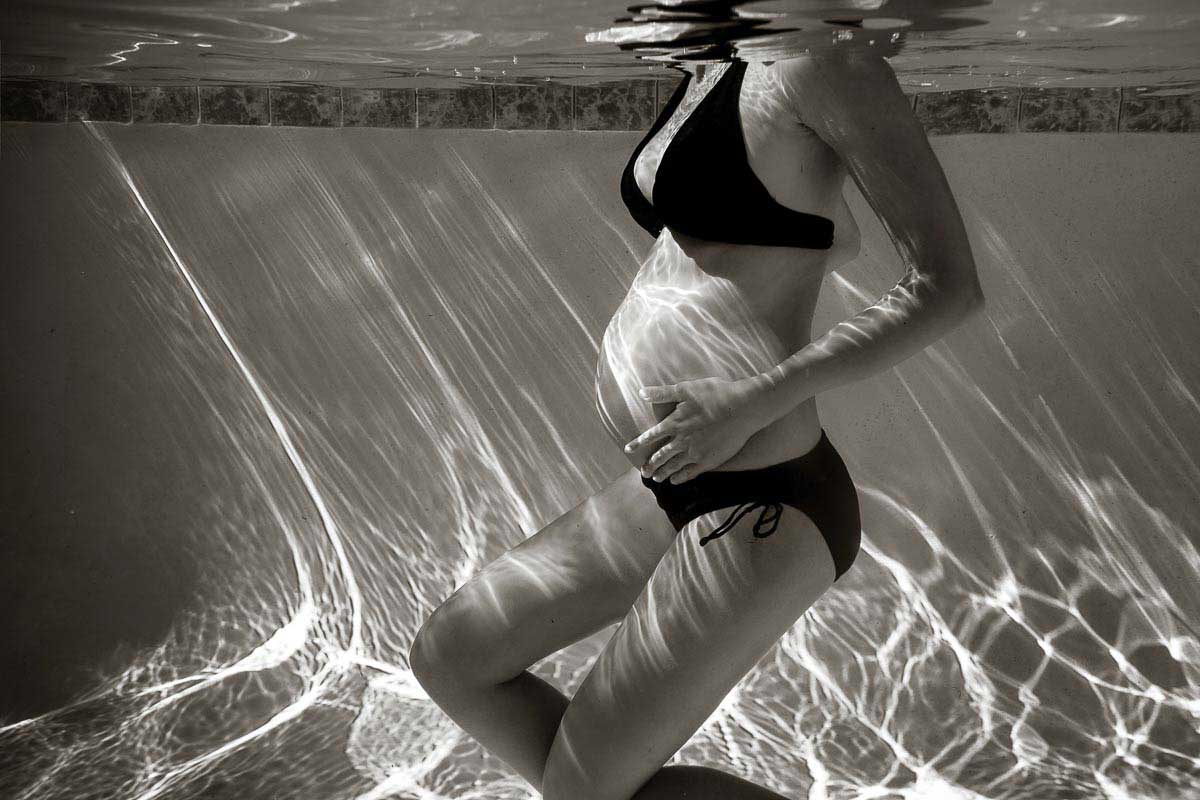The question of can you scuba dive while pregnant comes up frequently in diving circles. If you think back to your Open Water training, you’ll remember that they discourage women from diving while pregnant. But the exact reasons are not always explained. Mostly, there are limitations to the research that is possible. Experimenting with pregnant women is far from ethical.
The majority of studies conducted about scuba diving and pregnancy are limited to surveys of female divers who have recently given birth. In one study, 69 women who hadn’t dived during their pregnancy and 109 women who had were surveyed. Those who hadn’t been scuba diving while pregnant reported no congenital disabilities. Those who had reported a defect incidence of 5.5% in their babies.
But as stated by the author, 5.5% is within the normal range of birth defect incidence for the general population. Also, the small sample size of women and their likelihood of selection bias makes the survey results difficult to interpret accurately. So, while this study established a correlation for doing scuba while pregnant, it cannot confirm a causal relationship that diving caused the defect.
As with any health-related issue, it’s vital that women who are pregnant – or trying to conceive – consult with their doctors prior. Your doctor will be able to advise you of the latest pregnancy-related scuba diving research findings and recommendations. They will also be able to advise when it’s safe to return to the sport after giving birth.
CAN YOU SCUBA DIVE WHILE PREGNANT?
- Hyperbaric Chamber Pregnancy Studies
- Decompression Sickness
- Practical Considerations for Scuba Diving While Pregnant
- Scuba Diving in Early Pregnancy
- Scuba Diving While Trying to Get Pregnant
- Can You Free Dive or Snorkel While Pregnant?
- What Are the Risks Involved with Scuba Diving While Pregnant?
- What Are the Risks Involved with Snorkeling and Freediving While Pregnant?
- What Wetsuit Can I Wear While Pregnant?
- Final Thoughts
Rather than testing on humans, scuba diving pregnancy studies using various species of animals have been conducted in hyperbaric chambers. These simulate the increased pressure environment that we experience when diving. A safe limit for the partial pressure of oxygen (PO2) is generally accepted as being between 1.4 and 1.6 atmospheres of absolute pressure.
Rodents have been used to study the effects of hyperbaric oxygenation (HBO) exposure and decompression sickness (DCS) on developing fetuses. It’s worth keeping in mind that most studies have focused on the first and third trimesters of pregnancy. First-trimester research has looked at the effects of hyperbaric oxygen on birth defects. Third-trimester studies have looked at the effects of decompression sickness on the fetus and its circulatory system.
In one scuba pregnancy study, the results showed that female hamsters with untreated decompression sickness had offspring with severe limb and skull abnormalities. Those experiencing hyperbaric oxygenation-treated decompression sickness also had offspring with defects, although with less frequency. In neither group were there noticeable differences in anatomical development.
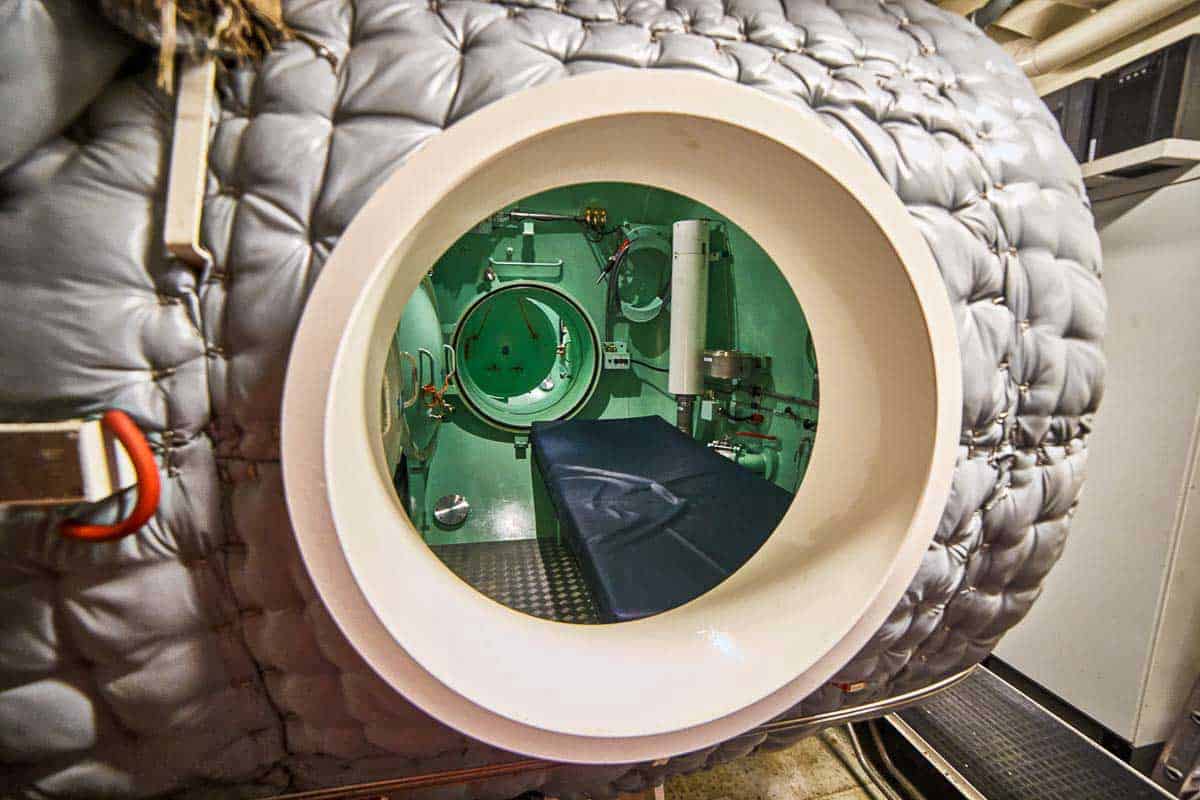
In another study of HBO-exposed rats, there were no significant differences in the offspring from mothers who had “dived” and those who hadn’t. However, the partial pressure of oxygen (PO2) was lower than in the hamster study (1.3 bar). So, if the rats were breathing normal air at 21% oxygen, this would be equivalent to a 52-meter-deep dive.
The results from these studies can be translated to the human experience, and the question of can pregnant women dive. They indicated that a range of developmental abnormalities might be associated with hyperbaric exposure and scuba diving pregnant. These include low birth weights, fetal abortion, and bubbles in the amniotic fluid, as well as premature delivery. Abnormal skull and heart development, malformed limbs, changes in the fetal circulation and blindness may also result.
Aside from rodents, sheep have also been used in experiments related to diving during pregnancy as their placenta is similar to the human placenta. Under decompression stress, blood returning to the heart may contain venous gas emboli (“bubbles”) that are a symptom of decompression sickness. The results of tests using sheep indicated that fetal sheep whose mothers did decompression “dives” (beyond U.S. Navy dive table limits) formed bubbles. This was observed even if the mother showed no signs of decompression sickness. When the mothers did show signs, the fetuses exhibited even more dramatic evidence of bubbles.
The sheep that “dived” late in pregnancy had offspring with weak limbs, spinal defects, and heart abnormalities that may be attributed to decompression sickness. This was evidenced even when the mother exhibited no symptoms. While fully-formed lungs are effective in filtering bubbles from circulation, a fetus receives blood and exchanges gas through the placenta, bypassing its lungs. As pulmonary filtration doesn’t occur within the fetus, the risk of arterial gas embolism is increased as these bubbles can reach the fetus’ brain, spine, and other vital organs.
Aside from the risks that diving when pregnant can pose to an unborn baby, there are also more practical considerations for the mother. Your growing belly can make it difficult to fit into a wetsuit or BCD, as well as impact your ability to wear a weight belt. Managing your buoyancy may also be difficult, as your weight will likely change throughout your pregnancy.
In addition, swelling of the mucous membranes in the sinuses can make equalizing more difficult for expectant mothers and cause discomfort. As pregnant women are prone to nausea and morning sickness, this can also make the idea of diving or being out on boats less than pleasurable. While you might be wondering, “can I scuba dive while pregnant,” you should also consider that you may have no desire to as a result of the changes taking place in your body.
While studies aren’t clear as to the impact of diving on the fetus during early pregnancy, women are advised to be cautious and avoid the sport. First-trimester research on rodents has indicated that birth defects may result if pregnant women dive. Abnormalities were observed even if the mother was treated for decompression sickness. Diving organizations and dive shops around the world will advise expectant women against diving, no matter what stage of pregnancy they are in.
However, if you do happen to dive while you’re unknowingly pregnant, there’s no immediate cause for alarm. Many women have reported diving repeatedly during pregnancy without experiencing any complications. As with diving at any point in life, it’s essential that you stay within no-decompression limits and don’t expose your body to unnecessary stress. If you are exposed to decompression sickness, emergency hyperbaric oxygen is recommended for the safety of both you and your unborn child.
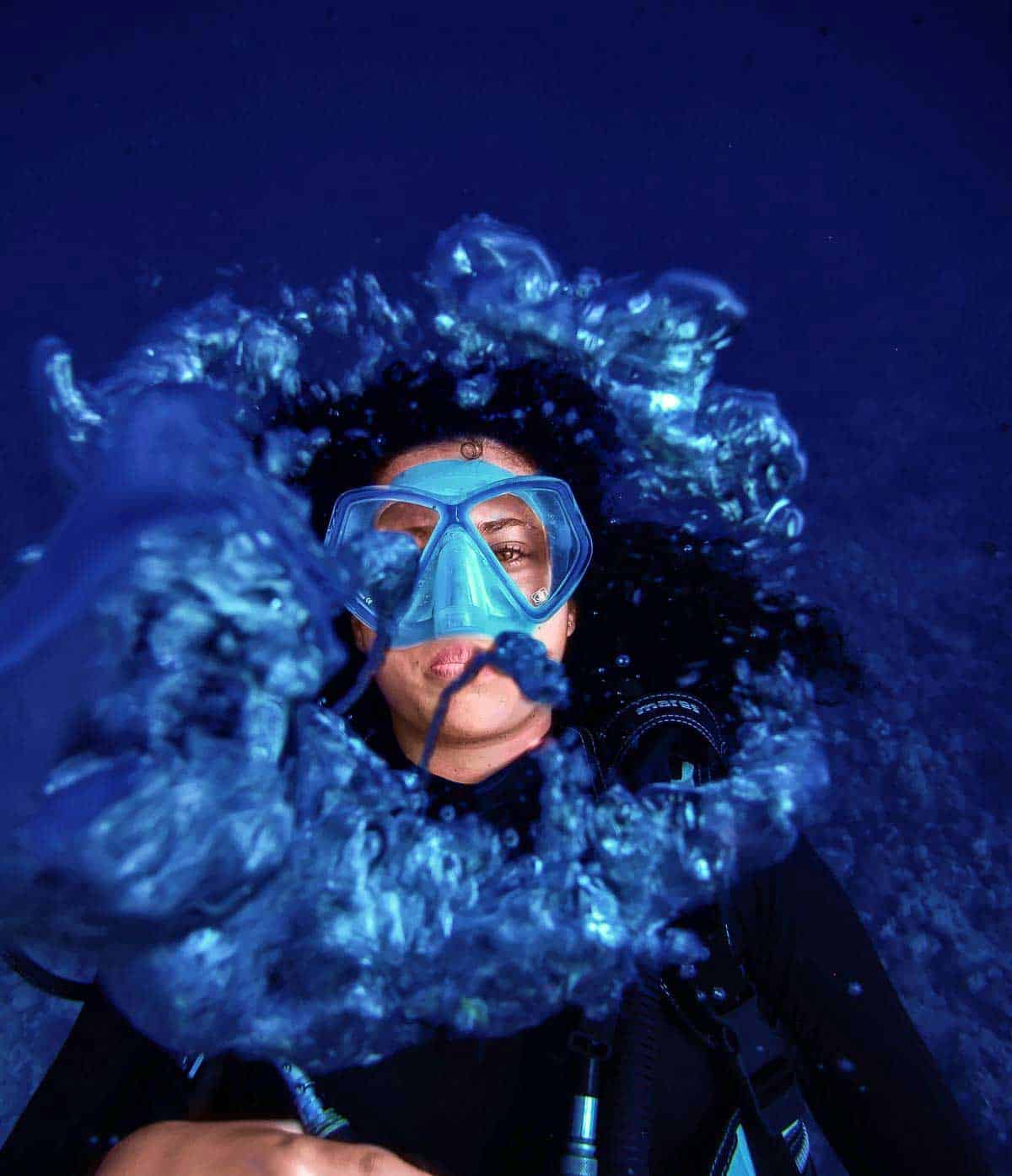
There is no available literature or studies that specifically address whether or not women should dive while trying to conceive, although experts have expressed their opinions. Some recommend that it’s best to avoid diving while trying to get pregnant to avoid any potential variables that could negatively impact the baby. Others suggest waiting for at least 48 hours after diving before trying to conceive. This allows time for any inert gas to be eliminated from the body. If you want to be on the safe side, avoid diving entirely while trying to get pregnant and stick to snorkeling instead.
As with scuba diving, the studies that have been undertaken on pregnant women freediving are limited. Most have been conducted on Japanese Ama divers and Korean Haenyo divers who make their living by freediving for pearls and abalone. Most continue to work well into their pregnancies without exhibiting any adverse effects on their babies.
But as the results are inconclusive, it’s recommended that women freedive conservatively during their pregnancy. This might mean staying closer to the surface than you would normally to avoid putting your body under additional stress.
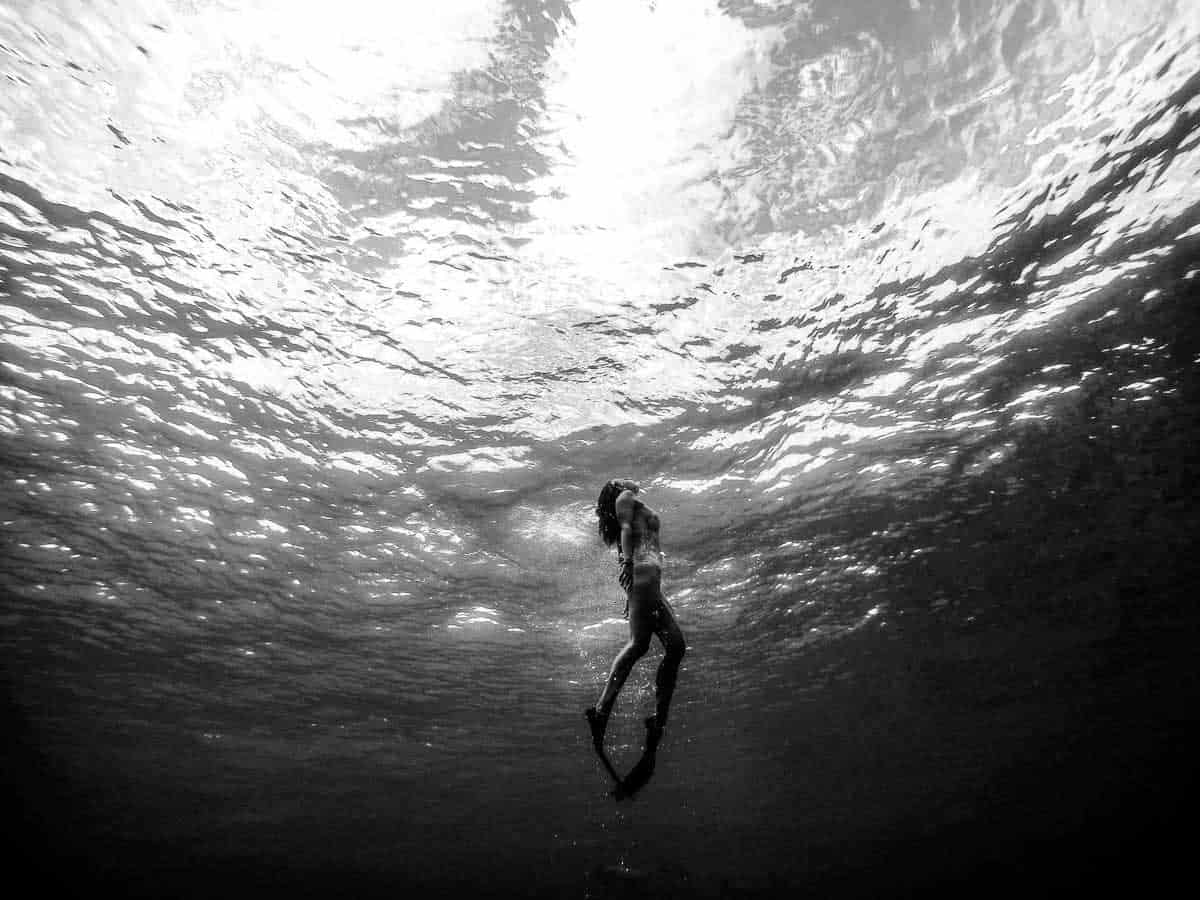
You might also be wondering can you snorkel when pregnant? Snorkeling is completely safe for women while pregnant and is even encouraged. Floating in the water can help to alleviate many of the stresses the body encounters during pregnancy, such as swollen joints, aches, and pains. Snorkeling while pregnant is a great alternative for women who are keen divers and struggle with the idea of being out of the water for nine months. You’ll still get to experience all the wonders of the underwater world without putting you or your baby at risk.
The risks involved with scuba diving while pregnant are inconclusive, with studies limited by the unethical nature of testing on humans. However, animal studies have suggested that there may be developmental abnormalities in fetuses as a result of diving. These range from the abnormal skull and heart development to malformed and weak limbs, as well as premature delivery, fetal abortion, and low birth weights. While it’s unknown if these developmental abnormalities will translate directly to humans, experts recommend that women err on the cautious side and avoid diving while pregnant.
The risks involved with freediving while pregnant are not clear, with few studies conducted on the subject. While commercial freedivers in Asia have continued to work throughout their pregnancy without any adverse effects, expectant women are advised to freedive with caution. This might mean staying closer to the surface than normal – something that will probably become practicality once your belly begins to swell!
Snorkeling while pregnant poses no risk to women or their unborn child. In fact, snorkeling and pregnancy go hand-in-hand. The weightless experience of being in the water can be therapeutic for expectant mothers. It will help to relieve any stresses on your body, such as swollen joints, aches, and pains that are commonly experienced during pregnancy.
There are no wetsuits currently on the market that have been specifically designed for pregnant women. If you’re looking for the best wetsuits for ladies on the market, our buyer’s guide is ideal for waterborne women like yourselves. Alternatively, finding a wetsuit with super stretch is your best option if you want something you can grow into over nine months. We would recommend Henderson’s Thermoprene 3mm Wetsuit for Women.
Henderson
Thermoprene 3mm Women’s Wetsuit
One of the stretchiest women’s wetsuits on the market is the Henderson Thermoprene 3mm wetsuit. It offers great performance with an affordable price tag. It’s designed with 180% super stretch, meaning it will adapt to your swelling belly as you progress throughout your pregnancy. The neoprene is laminated with a pill and abrasion-resistant fabric for extra durability. All of the seals are glued and blindstitched to prevent water from seeping in. The cuff edges are also lycra trimmed to prevent chafing and provide that little extra comfort. Henderson’s Thermoprene wetsuits are fitted with back zippers and Freedom Flex knee pads, as well as an adjustable neck to ensure a customized fit. Women who are pregnant might want to purchase one size up to ensure there’s room to grow!
Standout features:
- Super stretchy neoprene that will accommodate pregnant women
- Abrasion-resistant fabric
- Blindstitched seams
- Full-length design for warm or cool-water conditions
Specs:
BRAND: Henderson
MATERIAL: Neoprene
ZIP: Back zip
THICKNESS: 3mm
The question of whether you can scuba dive while pregnant is one that may never be answered conclusively. However, research studies on diving while pregnant suggest that it may put the fetus at increased risk of birth defects or abnormalities. As a result, it’s highly recommended that women avoid diving while pregnant. However, those who inadvertently participate in scuba while pregnant shouldn’t worry. There’s plenty of anecdotal evidence from other women who have dived while pregnant without experiencing any complications.
Due to the ethical challenges of conducting more research on the topic, it’s unlikely that further studies will be done in the foreseeable future on the question of can pregnant women scuba dive. On the other hand, freediving within conservative limits appears to have little impact on unborn babies. Women who are asking themselves, “can I snorkel while pregnant” can take solace in the knowledge that this activity is completely fine. So, you don’t have to miss out on experiencing the wonders of the underwater world completely.
Remember that you should always consult your doctor before trying to conceive or while pregnant to get their expert recommendations. The question of whether you can scuba dive while pregnant should also extend to post-delivery. Check with your doctor after giving birth as to when it’s safe to return to diving, with most advising anywhere between four and eight weeks.
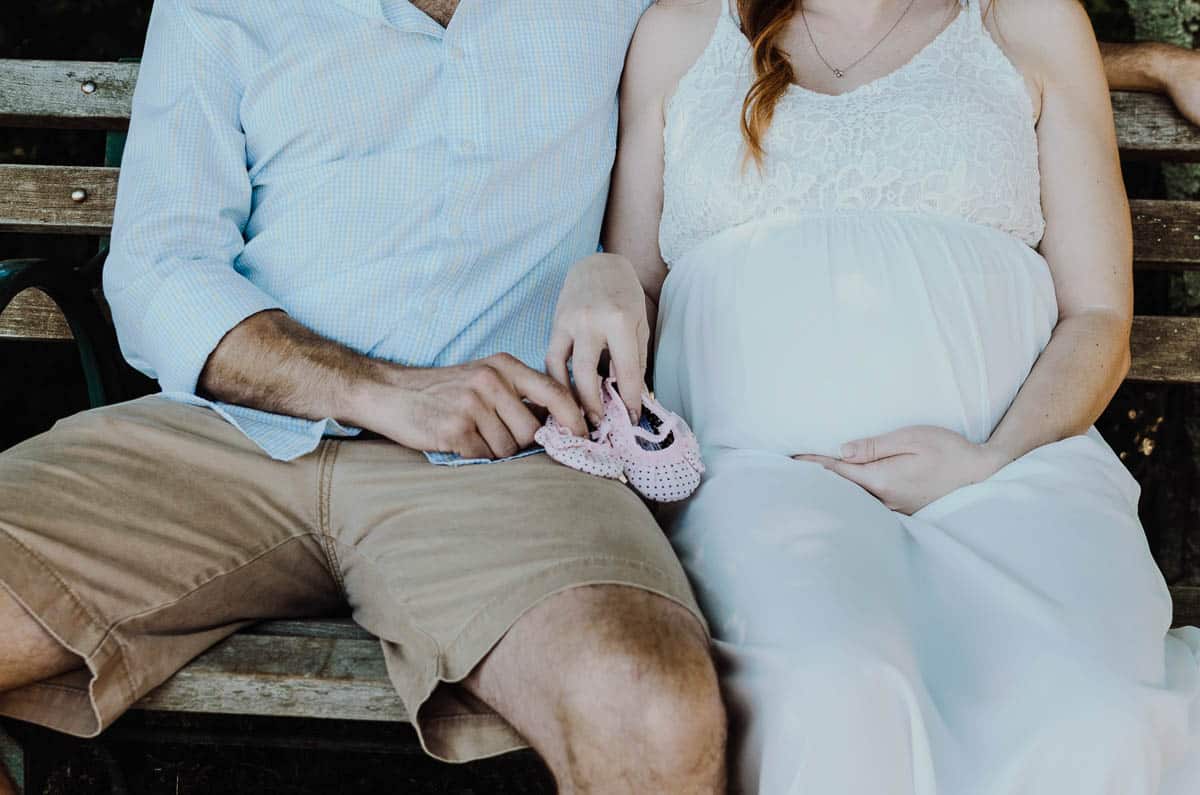
- The Ultimate Guide to Exercise During Pregnancy, momlovesbest.com
- Diving Risk Factors, thediverclinic.com
- Pregnancy & Diving, dansa.org
- Exercise During Pregnancy: Safe And Beneficial, mayoclinic.org
As always, we create our content with you, fellow divers, in mind. So, how’d we do? Did you find this informative? Did it help you make a decision? Did we miss anything? We’d love to hear from you below. Thanks for reading and we hope your next dive is a great one!


